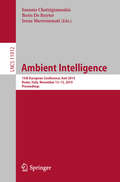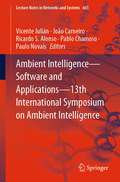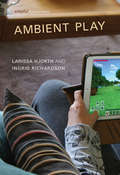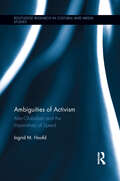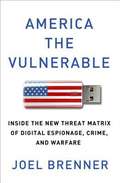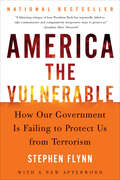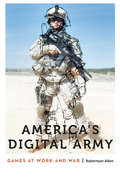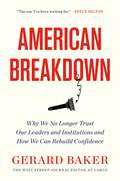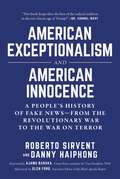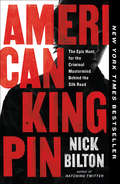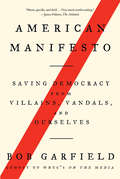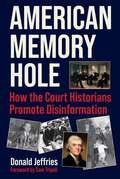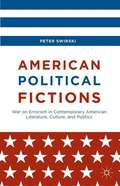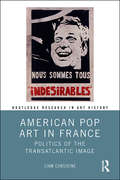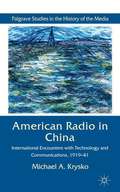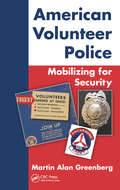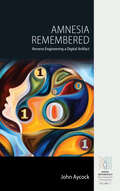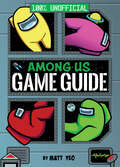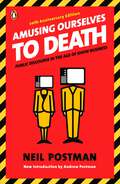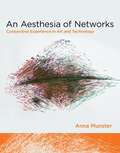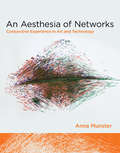- Table View
- List View
Ambient Intelligence: 15th European Conference, AmI 2019, Rome, Italy, November 13–15, 2019, Proceedings (Lecture Notes in Computer Science #11912)
by Boris De Ruyter Irene Mavrommati Ioannis ChatzigiannakisThis book constitutes the refereed proceedings of the 15th European Conference on Ambient Intelligence, AmI 2019, held in Rome, Italy, in November 2019. The 20 full papers presented together with 10 short papers were carefully reviewed and selected from 50 submissions. The papers cover topics such as embedded devices that can merge unobtrusively and in natural ways using information and intelligence hidden in the network connecting these devices (e.g., the Internet of Things). The main topic of AmI 2019 was “Data-driven Ambient Intelligence,” which follows the vision of Calm Technology, where technology is useful but does not demand our full attention or interfere with our usual behavior and activities.
Ambient Intelligence—Software and Applications—13th International Symposium on Ambient Intelligence (Lecture Notes in Networks and Systems #603)
by Paulo Novais Vicente Julián Pablo Chamoso João Carneiro Ricardo S. AlonsoThis book presents the latest research on Ambient Intelligence including software and applications. Ambient Intelligence (AmI) is a paradigm emerging from Artificial Intelligence, where computers are used as proactive tools assisting people with their day-to-day activities, making everyone’s life more comfortable. The inclusion of computational power and communication technologies in everyday objects is growing, and their embedding into our environments should be as invisible as possible. In order for AmI to be successful, human interaction with computing power and embedded systems in the surroundings should be smooth and happen without people actually noticing it. The only awareness people should have arises from AmI: more safety, comfort and wellbeing, emerging in a natural and inherent way. ISAmI is the International Symposium on Ambient Intelligence, aiming to bring together researchers from various disciplines that constitute the scientific field of AmI to present and discuss the latest results, new ideas, projects and lessons learned.
Ambient Play (Playful Thinking)
by Larissa Hjorth Ingrid RichardsonAn engaging look at how mobile games are increasingly part of our day-to-day lives and the ways that we interact across real as well as digital landscapes.We often play games on our mobile devices when we have some time to kill--waiting in line, pausing between tasks, stuck on a bus. We play in solitude or in company, alone in a bedroom or with others in the family room. In Ambient Play, Larissa Hjorth and Ingrid Richardson examine how mobile gameplay fits into our day-to-day lives. They show that as mobile games spread across different genres, platforms, practices, and contexts, they become an important way of experiencing and navigating a digitally saturated world. We are digital wayfarers, moving constantly among digital, social, and social worlds.
Ambiguities of Activism: Alter-Globalism and the Imperatives of Speed (Routledge Research in Cultural and Media Studies #43)
by Ingrid M. HoofdThis volume provides a critical and in-depth investigation of the relationship between alter-globalist thinking and practices and their popular discourses. It examines the ways in which several alter-globalist activist groups (like Indymedia, no-borders campaigns, and forms of climate change activism), as well as left-wing intellectuals and academics (like Michael Hardt, Al Gore, Antonio Negri, Hakim Bey, and Geert Lovink), mobilize problematic discourses, tools, and divisions in an attempt to overcome gendered, raced, and classed oppressions worldwide. The book draws out how these mobilizations and theorizations, despite (or possibly because of) their liberatory claims, are actually implicated in the intensification of global hierarchies by repeatedly invoking narratives of transcendence, connection, progress, and in particular of speed. Hoofd argues that the humanist ideals that underlie all these practices paradoxically trigger increasing disenfranchisements worldwide.
Ambivalenzen der Optimierung (Würzburger Beiträge zur Designforschung)
by Gerhard Schweppenhäuser Christian Bauer Judith-Frederike PoppInnovation, Wachstum und Optimierung sind normative Grundlagen des Designs, der Technologie, der Wirtschaft, der Gesellschaft und der Kultur. Unter dem Vorzeichen der Digitalisierung zeichnen sich neue ›Optima‹ ab, in denen Menschen zum Bestandteil entgrenzter Netzwerkstrukturen werden. Die in Würzburg entstandenen Aufsätze des vorliegenden Bandes gehen ambivalenten Aspekten dieser Entwicklung mit wissenschaftlichen und gestalterischen Methoden nach. Der Gastbeitrag geht der Frage nach, was dialektisches Denken in Diskurs und Praxis der Gestaltung bedeutet.
Ambivalenzen der digitalen Transformation: Ein neuer Ansatz zur Gestaltung von Wertschöpfungsprozessen
by Stefan BurgesDurch technische Neuerungen wie Internet-of-Things, Machine Learning und Künstliche Intelligenz verändert sich das Marktumfeld für Unternehmen schnell und ständig. Darauf gilt es in der Unternehmensführung ebenso schnell zu reagieren bzw. diese Neuerungen besser noch zu antizipieren. In seinem Buch richtet Stefan Burges seinen Blick nicht nur auf die technischen Möglichkeiten, sondern auch auf den Menschen. Er unterscheidet zwischen Arbeiten und Prozessen, die durch Digitalisierung an Schnelligkeit und Zuverlässigkeit gewinnen, und Abläufen, die auf der Kommunikation zwischen Menschen beruhen. Folgerichtig analysiert Burges im ersten Teil des Buches den Wertschöpfungsprozess, die Protagonisten – digitale Systeme und Mitarbeiter – sowie deren Kommunikation. Im zweiten Teil werden strategische Handlungsfelder identifiziert und Alternativen für einen nachhaltigen Wertschöpfungsprozess vorgestellt.
America the Vulnerable
by Joel BrennerA former top-level National Security Agency insider goes behind the headlines to explore America's next great battleground: digital security. An urgent wake-up call that identifies our foes; unveils their methods; and charts the dire consequences for government, business, and individuals. Shortly after 9/11, Joel Brenner entered the inner sanctum of American espionage, first as the inspector general of the National Security Agency, then as the head of counterintelligence for the director of national intelligence. He saw at close range the battleground on which our adversaries are now attacking us-cyberspace. We are at the mercy of a new generation of spies who operate remotely from China, the Middle East, Russia, even France, among many other places. These operatives have already shown their ability to penetrate our power plants, steal our latest submarine technology, rob our banks, and invade the Pentagon's secret communications systems. Incidents like the WikiLeaks posting of secret U. S. State Department cables hint at the urgency of this problem, but they hardly reveal its extent or its danger. Our government and corporations are a "glass house," all but transparent to our adversaries. Counterfeit computer chips have found their way into our fighter aircraft; the Chinese stole a new radar system that the navy spent billions to develop; our own soldiers used intentionally corrupted thumb drives to download classified intel from laptops in Iraq. And much more. Dispatches from the corporate world are just as dire. In 2008, hackers lifted customer files from the Royal Bank of Scotland and used them to withdraw $9 million in half an hour from ATMs in the United States, Britain, and Canada. If that was a traditional heist, it would be counted as one of the largest in history. Worldwide, corporations lose on average $5 million worth of intellectual property apiece annually, and big companies lose many times that. The structure and culture of the Internet favor spies over governments and corporations, and hackers over privacy, and we've done little to alter that balance. Brenner draws on his extraordinary background to show how to right this imbalance and bring to cyberspace the freedom, accountability, and security we expect elsewhere in our lives. In America the Vulnerable, Brenner offers a chilling and revelatory appraisal of the new faces of war and espionage-virtual battles with dangerous implications for government, business, and all of us. .
America the Vulnerable: How Our Government is Failing to Protect Us Against Terrorism
by Stephen FlynnIn this powerful and urgently needed call to action, national security expert Stephen Flynn offers a startling portrait of the radical shortcomings in America's plan for homeland security. He describes a frightening scenario of what the next major terrorist attack might look like -- revealing the tragic loss of life and economic havoc it would leave in its wake, as well as the seismic political consequences it would have in Washington. Flynn also shows us how to prepare for such a disaster, outlining a bold yet practical plan for achieving security in a way that is safe and smart, effective and manageable.In this new world of heightened risk and fear, America the Vulnerable delivers a timely, forceful message that cannot be ignored.
America's Digital Army: Games at Work and War (Anthropology of Contemporary North America)
by Robertson AllenAmerica’s Digital Army is an ethnographic study of the link between interactive entertainment and military power, drawing on Robertson Allen’s fieldwork observing video game developers, military strategists, U.S. Army marketing agencies, and an array of defense contracting companies that worked to produce the official U.S. Army video game, America’s Army. Allen uncovers the methods by which gaming technologies such as America’s Army, with military funding and themes, engage in a militarization of American society that constructs everyone, even nonplayers of games, as virtual soldiers available for deployment.America’s Digital Army examines the army’s desire for “talented” soldiers capable of high-tech work; beliefs about America’s enemies as reflected in the game’s virtual combatants; tensions over best practices in military recruiting; and the sometimes overlapping cultures of gamers, game developers, and soldiers. Allen reveals how binary categorizations such as soldier versus civilian, war versus game, work versus play, and virtual versus real become blurred—if not broken down entirely—through games and interactive media that reflect the U.S. military’s ludic imagination of future wars, enemies, and soldiers.
American Breakdown: Why We No Longer Trust Our Leaders and Institutions and How We Can Rebuild Confidence
by Gerard BakerFrom the former editor-in-chief of the Wall Street Journal, a must-read account of how America suffers from a &“trust deficit&” that has weakened its cornerstone institutions and divided our society. AMERICAN BREAKDOWN dissects how, in the space of a generation, the pillars that sustained the once-dominant superpower have been dangerously eroded. From government to business, from media to medicine—the strength and security of the American experiment have been weakened by a widening gap between the elites who control these institutions and the public. At the root of this breakdown is a precipitous fall in Americans&’ trust in their political, business and cultural leaders. As Baker writes, &“This pathology of distrust across American society is eating the country away from the inside.&” Millions of Americans say they have little faith in their country's future, and no longer seem to have trust in their leaders, in their important social and civil institutions, even in their common values and ideals, or ultimately in each other. America in fact hasn&’t failed. Americans have been failed—misled by inept and deceitful political leaders, deserted by predatory and cynical corporate chiefs, and, above all, betrayed by a cultural elite that has exploited the very freedom this country provided in order to destroy it. AMERICAN BREAKDOWN is a deep analysis and thought-provoking account that explores the ways in which Americans have been let down and offers solutions for how we rebuild trust and reclaim purpose for a better future.
American Exceptionalism and American Innocence: A People's History of Fake News—From the Revolutionary War to the War on Terror
by Sirvent Roberto Haiphong DannyDid the U.S. really “save the world” in World War II? Should black athletes stop protesting and show more gratitude for what America has done for them? Are wars fought to spread freedom and democracy? Or is this all fake news?American Exceptionalism and American Innocence examines the stories we’re told that lead us to think that the U.S. is a force for good in the world, regardless of slavery, the genocide of indigenous people, and the more than a century’s worth of imperialist war that the U.S. has wrought on the planet. Sirvent and Haiphong detail just what Captain America’s shield tells us about the pretensions of U.S. foreign policy, how Angelina Jolie and Bill Gates engage in humanitarian imperialism, and why the Broadway musical Hamilton is a monument to white supremacy.
American Kingpin: The Epic Hunt for the Criminal Mastermind Behind the Silk Road
by Nick BiltonThe unbelievable true story of the man who built a billion-dollar online drug empire from his bedroom—and almost got away with it In 2011, a twenty-six-year-old libertarian programmer named Ross Ulbricht launched the ultimate free market: the Silk Road, a clandestine Web site hosted on the Dark Web where anyone could trade anything—drugs, hacking software, forged passports, counterfeit cash, poisons—free of the government’s watchful eye. It wasn’t long before the media got wind of the new Web site where anyone—not just teenagers and weed dealers but terrorists and black hat hackers—could buy and sell contraband detection-free. Spurred by a public outcry, the federal government launched an epic two-year manhunt for the site’s elusive proprietor, with no leads, no witnesses, and no clear jurisdiction. All the investigators knew was that whoever was running the site called himself the Dread Pirate Roberts. The Silk Road quickly ballooned into $1.2 billion enterprise, and Ross embraced his new role as kingpin. He enlisted a loyal crew of allies in high and low places, all as addicted to the danger and thrill of running an illegal marketplace as their customers were to the heroin they sold. Through his network he got wind of the target on his back and took drastic steps to protect himself—including ordering a hit on a former employee. As Ross made plans to disappear forever, the Feds raced against the clock to catch a man they weren’t sure even existed, searching for a needle in the haystack of the global Internet. Drawing on exclusive access to key players and two billion digital words and images Ross left behind, Vanity Fair correspondent and New York Times bestselling author Nick Bilton offers a tale filled with twists and turns, lucky breaks and unbelievable close calls. It’s a story of the boy next door’s ambition gone criminal, spurred on by the clash between the new world of libertarian-leaning, anonymous, decentralized Web advocates and the old world of government control, order, and the rule of law. Filled with unforgettable characters and capped by an astonishing climax, American Kingpin might be dismissed as too outrageous for fiction. But it’s all too real.
American Manifesto: Saving Democracy from Villains, Vandals, and Ourselves
by Bob GarfieldDo you fear for our democracy? Are you perplexed by Trumpism? Are you ready to throw in the towel? Don’t! This is your guidebook to reassembling our hyperpolarized American society in six (not–so–easy) steps, written by cohost of WNYC's On the Media Bob GarfieldAs is often observed, Trump is a symptom of a virus that has been incubating for at least fifty years. But not often observed is where the virus is imbedded: in the psychic core of our identity. In American Manifesto: Saving Democracy from Villains, Vandals, and Ourselves, popular media personality Bob Garfield examines the tragic confluence of the American preoccupation with identity and the catastrophic disintegration of the mass media. Garfield investigates how we’ve gotten to this moment when our identity is threatened by both the left and the right, when e pluribus unum is no longer a source of national pride, and why, when looking through this lens of identity, the rise of Trumpism is no surprise. Overlaying this crisis is the rise of the Facebook–Google duopoly and the filter bubble of social media, where identity is insular and immutable.But fear not! WNYC’s On the Media cohost Garfield has ideas about how we may counter the forces of fragmentation—the manifesto itself: six steps to take to reassemble our fractured society. A quick, fascinating read, American Manifesto offers not only a vision of a country in extremis, but also a plan for how to address the ways in which our democracy is imperiled. Provocative, profound, and sometimes hilariously profane, American Manifesto is a call to action like no other.
American Memory Hole: How the Court Historians Promote Disinformation
by Donald JeffriesDonald Jeffries takes another deep dive down the historical rabbit holes with American Memory Hole: How the Court Historians Promote Disinformation. You will discover how cancel culture was born during the administration of Franklin D. Roosevelt. And how our interventionist foreign policy was established during the Woodrow Wilson presidency. Jeffries documents the tragically common atrocities committed by US troops, beginning with the Mexican-American War, which became official policy under the &“total war&” and &“scorched earth&” strategy of Abraham Lincoln&’s bloodthirsty generals. He recounts the shocking abuses of our military forces, in countries like Mexico, Haiti, the Philippines, and elsewhere. Jeffries builds on his groundbreaking investigation into the murder of John F. Kennedy, Jr., uncovering even more evidence of conspiracy and cover-up. He talked to people no researcher has talked to before, in a powerful new section on the assassination of President John F. Kennedy. Jeffries explores the Kennedy family in general, and finds that the establishment, especially the Left, continues to treat them unfairly. The events of September 11, 2001, and the Oklahoma City Bombing are investigated in depth as never before. There is stunning new information on much maligned Senator Joseph McCarthy, who emerges here not as some irredeemable monster, but as a genuine American patriot who has been demeaned in death even more than he was in life. The reader will never look at the supposed heroes and villains of American history the same way again after reading this book. History is written by the victors.
American Political Fictions
by Peter SwirskiAmerican Political Fictions rewrites the book on American political art in a myth-busting study that ranges from historical 'faction' and apocalyptic thrillers to satirical fiction, rap poetry, TV'sThe West Wing, and not least the make-believe that streams out of the White House. It critically, not to say skeptically, sieves out historical facts from a sea of partisan and bipartisan disinformation in order to forge a more accurate picture of contemporary American culture and, through it, of America itself. In the process, it elucidates the ideological underpinnings, cultural manifestations, and democratic essence of contemporary political art - and of the partisan politics on which it feeds.
American Pop Art in France: Politics of the Transatlantic Image (Routledge Research in Art History)
by Liam ConsidinePop art was essential to the Americanization of global art in the 1960s, yet it engendered resistance and adaptation abroad in equal measure, especially in Paris. From the end of the Algerian War of Independence and the opening of Ileana Sonnabend’s gallery for American Pop art in Paris in 1962, to the silkscreen poster workshops of May ’68, this book examines critical adaptations of Pop motifs and pictorial devices across French painting, graphic design, cinema and protest aesthetics. Liam Considine argues that the transatlantic dispersion of Pop art gave rise to a new politics of the image that challenged Americanization and prefigured the critiques and contradictions of May ’68.
American Privacy: The 400-year History of Our Most Contested Right
by Frederick S. LaneA page-turning narrative of privacy and the evolution of communication, from broken sealing wax to high-tech wiretapping.
American Radio in China
by Michael A. KryskoInterwar era efforts to expand US radio into China floundered in the face of flawed US policies and approaches. Situated at the intersection of media studies, technology studies, and US foreign relations, this study frames the ill-fated radio initiatives as symptomatic of an increasingly troubled US-East Asian relationship before the Pacific War.
American Volunteer Police: Mobilizing for Security
by Martin Alan GreenbergToday, it is estimated there are over 200,000 volunteers in police work throughout the United States. Although the need for such volunteers has never been greater, there is a lack of published materials regarding the nature of volunteer police work and how qualified citizens may augment police services. American Volunteer Police: Mobilizing for Sec
Amnesia Remembered: Reverse Engineering a Digital Artifact (Digital Archaeology: Documenting the Anthropocene #2)
by John AycockOur modern culture is increasingly expressed in the form of digital artifacts, yet archaeology is in its infancy when it comes to researching and understanding them. The study and reverse engineering of digital artifacts is no longer the exclusive domain of computer scientists. Presented by way of analogy to the process of archaeological fieldwork familiar to readers, the 1986 Electronic Arts game Amnesia is used as a vehicle to explain the procedure and thought process required to reverse engineer a digital artifact. As a go-to reference to learn how to begin studying the digital, Amnesia is shown to be a multi-layered artifact with a complex backstory; through it, topics in data compression, copy protection, memory management, and programming languages are covered.
Among Us: 100% Unofficial Game Guide (100% Unofficial)
by Matt YeoBased on the smash hit game, Among Us: The Unofficial Game Guide is an in-depth handbook to the world of Among Us!View secret mini-games, discover layered maps, analyze strengths & weaknesses of crewmates and benefits of ghosts, and much more. This unofficial guidebook is a must for fans of the smash hit game Among Us!Among Us is set in space where you and a group of crewmates are given tasks and problems to complete in order to survive. But, among the group lives an imposter whose sole goal is to sabotage the group’s progress and eventually take out every player on that team. It’s up to you and the rest of the crew members to discover who it is!Among Us has quickly become one of the most played games of 2020, with a 10/10 rating on Steam, becoming a hit with over 100 million fans of all ages. It is available for download on iOS, Android, and Windows.
Amusing Ourselves to Death: Public Discourse in the Age of Show Business (Colección Ideas/tempestad Ser. #Vol. 2)
by Neil Postman Andrew PostmanWhat happens when media and politics become forms of entertainment? As our world begins to look more and more like Orwell's 1984, Neil's Postman's essential guide to the modern media is more relevant than ever."It's unlikely that Trump has ever read Amusing Ourselves to Death, but his ascent would not have surprised Postman.” -CNNOriginally published in 1985, Neil Postman’s groundbreaking polemic about the corrosive effects of television on our politics and public discourse has been hailed as a twenty-first-century book published in the twentieth century. Now, with television joined by more sophisticated electronic media—from the Internet to cell phones to DVDs—it has taken on even greater significance. Amusing Ourselves to Death is a prophetic look at what happens when politics, journalism, education, and even religion become subject to the demands of entertainment. It is also a blueprint for regaining control of our media, so that they can serve our highest goals.“A brilliant, powerful, and important book. This is an indictment that Postman has laid down and, so far as I can see, an irrefutable one.” –Jonathan Yardley, The Washington Post Book World
An ASIC Low Power Primer: Analysis, Techniques and Specification
by J. Bhasker Rakesh ChadhaThis book provides an invaluable primer on the techniques utilized in the design of low power digital semiconductor devices. Readers will benefit from the hands-on approach which starts form the ground-up, explaining with basic examples what power is, how it is measured and how it impacts on the design process of application-specific integrated circuits (ASICs). The authors use both the Unified Power Format (UPF) and Common Power Format (CPF) to describe in detail the power intent for an ASIC and then guide readers through a variety of architectural and implementation techniques that will help meet the power intent. From analyzing system power consumption, to techniques that can be employed in a low power design, to a detailed description of two alternate standards for capturing the power directives at various phases of the design, this book is filled with information that will give ASIC designers a competitive edge in low-power design.
An Aesthesia of Networks
by Anna MunsterToday almost every aspect of life for which data exists can be rendered as a network. Financial data, social networks, biological ecologies: all are visualized in links and nodes, linesconnecting dots. A network visualization of a corporate infrastructure could look remarkably similarto that of a terrorist organization. In An Aesthesia of Networks, Anna Munsterargues that this uniformity has flattened our experience of networks as active and relationalprocesses and assemblages. She counters the "network anaesthesia" that results from thispervasive mimesis by reinserting the question of experience, or aesthesia, into networked cultureand aesthetics. Rather than asking how humans experience computers and networks, Munster asks hownetworks experience -- what operations they perform and undergo to change andproduce new forms of experience. Drawing on William James's radical empiricism, she asserts thatnetworked experience is assembled first and foremost through relations, which make up its mostimmediately sensed and perceived aspect. Munster critically considers a range of contemporaryartistic and cultural practices that engage with network technologies and techniques, includingdatabases and data mining, the domination of search in online activity, and the proliferation ofviral media through YouTube. These practices -- from artists who "undermine" data tomusicians and VJs who use intranetworked audio and video software environments -- are concerned withthe relationality at the core of today's network experience.
An Aesthesia of Networks: Conjunctive Experience in Art and Technology (Technologies of Lived Abstraction)
by Anna MunsterThe experience of networks as the immediate sensing of relations between humans and nonhuman technical elements in assemblages such as viral media and databases.Today almost every aspect of life for which data exists can be rendered as a network. Financial data, social networks, biological ecologies: all are visualized in links and nodes, lines connecting dots. A network visualization of a corporate infrastructure could look remarkably similar to that of a terrorist organization. In An Aesthesia of Networks, Anna Munster argues that this uniformity has flattened our experience of networks as active and relational processes and assemblages. She counters the “network anaesthesia” that results from this pervasive mimesis by reinserting the question of experience, or aesthesia, into networked culture and aesthetics.Rather than asking how humans experience computers and networks, Munster asks how networks experience—what operations they perform and undergo to change and produce new forms of experience. Drawing on William James's radical empiricism, she asserts that networked experience is assembled first and foremost through relations, which make up its most immediately sensed and perceived aspect. Munster critically considers a range of contemporary artistic and cultural practices that engage with network technologies and techniques, including databases and data mining, the domination of search in online activity, and the proliferation of viral media through YouTube. These practices—from artists who “undermine” data to musicians and VJs who use intranetworked audio and video software environments—are concerned with the relationality at the core of today's network experience.
